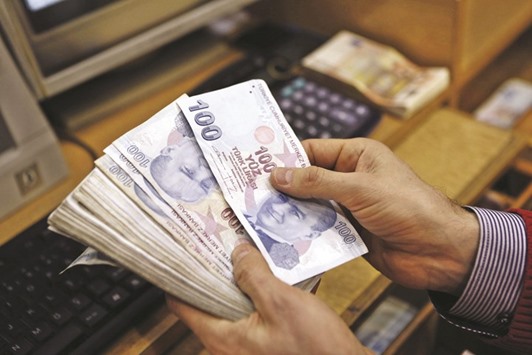Turkish markets closed lower yesterday as Prime Minister Ahmet Davutoglu was set to step down after weeks of tension between him and President Tayyip Erdogan unnerved investors.
Dollar selling by local forex investors in Turkey reached around $1.5bn, bankers told Reuters, as investors looked to book dollar profits following sharp drops in the lira this week.
Any renewed political uncertainty is credit negative as it could diminish investor confidence, credit ratings agency Moody’s said.
Prime Minister Ahmet Davutoglu appealed to AK Party members to avoid any splits when he steps down as party leader this month and vowed his loyalty to President Tayyip Erdogan, helping to partially ease market fears.
Davutoglu’s plan to step down, which emerged late on Wednesday, gave investors some clarity following days of uncertainty about his future, and his decision was widely seen as the result of tension between him and Erdogan, who founded the party.
“Davutoglu’s statement was interpreted as indicating that the transition period would be trouble-free. Hence the markets’ selling reaction eased,” said one bank’s treasury desk head.
“Risks have not been completely eliminated but losses have eased after comments supporting the view that the process won’t lead to more pessimistic scenarios,” he said.
The lira, which hit 2.9765 against the dollar late on Wednesday, stood at 2.9269 by 0524 GMT. It had been below 2.8 on Monday, its firmest for six months.
The 10-year bond yield, which rose to 9.95% in early trade closed at 9.81%, from 9.62% on Wednesday.
The BIST 100 index, the broadest measure of the Istanbul stock market’s performance, had fallen more than 2% early on and closed down 0.86% at 78,698.84 points, the lowest level since March 8.
Davutoglu’s announcement yesterday came after a meeting with Erdogan on Wednesday evening that followed weeks of public tension between the two.
Still, his departure raises difficult questions about the government’s ability to tackle slowing growth and pass into law the structural reforms that many investors are demanding.
“The spike in political tension has weighed on TRY (Turkey)-denominated assets, amid a backdrop of deteriorating global risk appetite,” Finansbank said in a note.
“The political environment is very unpredictable, and this will certainly have negative repercussions for Turkey’s risk premium, financial volatility and macroeconomic outlook.”
Erdogan wants an executive presidency in Turkey to replace the parliamentary system, a plan for which Davutoglu had offered only lukewarm support.
His departure is likely to pave the way for a successor more willing to back Erdogan’s ambition of changing the constitution and strengthening the presidency.

A money changer counts Turkish lira bills at a currency exchange office in central Istanbul. The lira, which hit 2.9765 against the dollar late on Wednesday, stood at 2.9269 by 0524 GMT yesterday. It had been below 2.8 on Monday, its firmest for six months.
